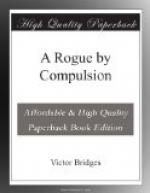Pressed still further, he admitted meeting Mr. Lyndon in Chelsea on the night of the murder, when the latter had to all intents and purposes acknowledged his guilt.
On the evidence there could naturally be only one verdict, and Lyndon was found guilty and sentenced to death by Mr. Justice Owen.
A tremendous agitation in favour of his reprieve broke out at once. Apart from the peculiar circumstances under which the crime was committed, it was urged that Mr. Lyndon’s services to the country as an inventor should be taken into consideration. Within twenty-four hours over a million people had signed a petition in his favour, and the following day His Majesty was pleased to commute the sentence to one of penal servitude for life.
There is little doubt, however, that Lyndon would have been released at the end of ten or twelve years.
THE ESCAPED CONVICT’S CAREER
Neil Lyndon is the only son of the well-known explorer Colonel Grant Lyndon, who perished on the Upper Amazon some fifteen years ago. He was educated at Haileybury, and Oriel College, Oxford, where he took the highest honours in chemistry and mathematics. Coming down, he entered into partnership with his cousin Mr. George Marwood, and between them the two young inventors met with early and remarkable success. Their greatest achievement was of course the construction of the Lyndon-Marwood automatic torpedo, which was taken up four years ago, after exhaustive tests, by the British Government.
Lyndon is a man of exceptionally powerful physique. He successfully represented Oxford as a heavy-weight boxer in his last term, and the following year was runner up in the Amateur Championship. He is also a fine long-distance swimmer, and a well-known single-handed yachtsman.
Mr. George Marwood, whose painful position in connection with the trial aroused considerable sympathy, has carried on the business alone since his partner’s conviction. Quite recently, as our readers will recall, he was the victim of a remarkable outrage at his offices in Victoria Street. While he was working there by himself late at night, a couple of masked men broke into the building, bound and gagged him, and proceeded to ransack the safe. It is said that they secured plans and documents of considerable value, but owing to the non-arrest of the thieves the exact details have never come to light.
So ended the Daily Mail.
I finished reading, and taking a long breath, laid down the paper. Up till then I had heard nothing about the news contained in the last paragraph, and it sent my memory back at once to the big well-lighted room in Victoria Street where George and I had spent so many hours together. I wondered what the valuable “plans and documents” might be which the thieves were supposed to have secured. In my day we had always been pretty careful about what we left at the office, and any really important plans—such as those of the Lyndon-Marwood torpedo—were invariably kept at the safe deposit across the street.




